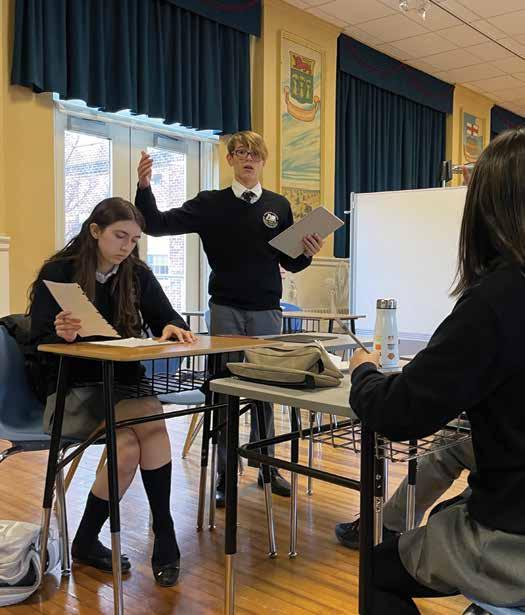
4 minute read
Make our words work for us
Polikon moves forward with courage
by Brendan Benson, Senior School faculty
Advertisement
Public speaking is so much more than debate. It is the practice of wit, active listening, making connections and synthesizing data and concepts for arguments that are to be presented in a variety of forms, but foremost the real endeavour of competitive public speaking is understanding how humility and sportsmanship—in high and low moments—are what make our words stronger.
On December 20, the Polikon Society executive met to evaluate its purpose at Pickering College as a public speaking society. We agreed that we will no longer refer to ourselves as a “debate” club, only as “Polikon,” a society centred on various modes of public speaking. Then it took only minutes from the opening of our meeting to establish a draft mission statement, vision, and aim intended to clarify our future at Pickering College.
I was impressed with the clarity of their responses, starting with Shyam Subramanyam’s succinct mission statement.
MISSION: to build public speaking confidence and recognize the power of our voice.
VISION: To use public speaking as a platform for issues that require our attention.
AIM: Make our words work for us.
Learning to “make our words work for us” is no small aim for Polikon to undertake, and Smetine Kurath was entirely correct to suggest such a well stated aim using such a deceptively powerful and inclusive pronoun. “Us” also requires coming to terms with our history, which is why Sandra Rohani suggested we make an effort to learn about our predecessors’ motivations and how they defined success.
What does Polikon even mean? What do we want it to mean going forward? And how is the composition of this society different from what it was 90 years ago? Learning to “make our words work for us” requires past, present and future thinking, and it has been made clear to me the ways this particular group of students have a legacy mindset. Before the end of the meeting, we agreed that for those of “us” in Polikon to be successful, we must recognize our linguistic and cultural backgrounds, our personal and academic knowledge, and believe that what we are doing with our voice is for the greater good.
We must also recognize that it takes courage to define the unknown. That it takes courage to address impossible challenges. That it takes courage to be better. And it is with courage that the executive articulated their vision of “public speaking as a platform for issues that require our attention” and that we should involve the Pickering College community at large in order to start.
In semester two, Polikon Society will meet every Friday, intent on engaging in challenges as they are presented to us by various groups at Pickering College. We will invite clubs like Youth Action Organization or the Green Team to pitch improvised and prepared motions related to social justice to debate, write speeches about, and discuss in roundtables “to build public speaking confidence and recognize the power of our voice.” It is our mission that community members who participate in Polikon elaborate their thinking about social justice and understand that “power” is a means of making changes for the common good. That power requires not only having command over our language but also a detailed understanding of the issues at hand. Knowledge, general knowledge, highly-specific knowledge, specialized knowledge, is what I want Polikon to be hungry for.
In my closing comment to the executive, during what was an incredibly productive meeting, I had to admit to them that having seen our students compete in two tournaments, we must have better knowledge about a range of issues than we currently do if we are to compete in the way I believe they want to. Skillfully delivering an argument is diffcult but doing so with knowledge is critical.
As we move forward with our mission, vision and aim, Polikon will continue to reach further and aspire to new challenges in the coming year.






